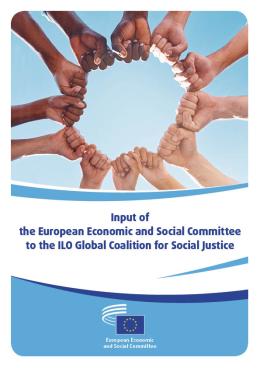European Economic
and Social Committee
AKR šalys ir Afrika
Nuo pirmosios Lomės konvencijos (1975 m.) iki Kotonu susitarimo (2000–2021 m.) ES ir Afrikos, Karibų ir Ramiojo vandenyno (AKR) valstybių grupei, kuri neseniai tapo Afrikos, Karibų jūros ir Ramiojo vandenyno valstybių organizacija (OACPS), priklausančių 79 valstybių santykiai buvo reguliuojami pagal AKR ir ES partnerystės susitarimus.
Per visą šį laikotarpį EESRK kartu su AKR pilietine visuomene kovojo, kad būtų pripažintas esminis nevalstybinių subjektų vaidmuo vystymosi procese, kol tai buvo padaryta Kotonu susitarimu, pagal kurį EESRK įgaliotas organizuoti veiklą ir konsultacijas su AKR šalių ir ES ekonominių ir socialinių interesų grupėmis siekiant sužinoti organizuotos pilietinės visuomenės nuomonę ir leisti jai išreikšti savo požiūrį. Tikslas – skatinti mainus ir rengti rekomendacijas dėl klausimų ir politikos, susijusios su AKR šalių ir ES santykiais, ir šias rekomendacijas vėliau oficialiai pateikti ES ir AKR šalių vadovams.
Praktiniu požiūriu su ES ir OACPS santykiais susijusi EESRK veikla vykdoma vadovaujant įtraukiam ES ir AKR šalių tęstinio darbo komitetui, kuriam priklauso EESRK nariai ir AKR šalių ekonominių ir socialinių interesų grupių atstovai.
ES ir AKR šalių tęstinio darbo komitetas palaiko reguliarius ryšius su AKR regiono pilietinės visuomenės atstovais įvairiais lygmenimis organizuojant:
- reguliarius AKR šalių ir ES tęstinio darbo komiteto posėdžius,
- regioninius seminarus AKR šalyse, kur pakaitomis skirtinguose regionuose aptariami bendro intereso klausimai su pilietinės visuomenės atstovais,
- kas trejus metus rengiamus AKR šalių ir ES ekonominių ir socialinių interesų grupių visuotinius posėdžius Briuselyje.
EESRK taip pat palaiko reguliarius ryšius su Afrikos Sąjungos ekonominių ir socialinių interesų grupių atstovais pagal bendrą Afrikos ir ES strategiją. EESRK būtent rengia metinius susitikimus su Afrikos ir ES ekonomikos ir socialinio sektorių suinteresuotųjų subjektų tinklu.
EESRK jau daugelį metų palaiko reguliarius ryšius su AKR ir ES jungtine parlamentine asamblėja ir pateikia savo veiklos ataskaitą plenarinės asamblėjos posėdžiuose.
EESRK taip pat palaiko glaudžius santykius su tarptautinėmis darbdavių, darbuotojų, ūkininkų, kooperatyvų ir vartotojų organizacijomis. Šios organizacijos skiria AKR šalių atstovus, kviečiamus dalyvauti EESRK rengiamuose susitikimuose, įskaitant AKR šalių ir ES tęstinio darbo komiteto susitikimus.


